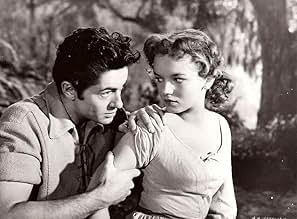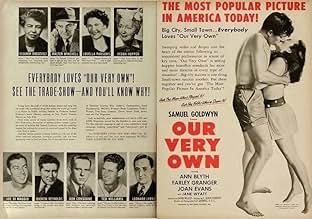Ajouter une intrigue dans votre langueGail discovers the shocking news that she is adopted during a heated argument with her sister, Joan. With the reluctant support of her adoptive parents and baby sister, Penny, Gail goes in s... Tout lireGail discovers the shocking news that she is adopted during a heated argument with her sister, Joan. With the reluctant support of her adoptive parents and baby sister, Penny, Gail goes in search of her biological mother and true identity.Gail discovers the shocking news that she is adopted during a heated argument with her sister, Joan. With the reluctant support of her adoptive parents and baby sister, Penny, Gail goes in search of her biological mother and true identity.
- Nommé pour 1 Oscar
- 3 nominations au total
- Violet
- (as Jessie Grayson)
- Gwendolyn
- (as Rita Hamilton)
- Poker Player
- (non crédité)
- Poker Player
- (non crédité)
- Boy at Birthday Party
- (non crédité)
- Card Player
- (non crédité)
- Student
- (non crédité)
Avis à la une
As depicted in this typical period film people dressed more formally, even in hot weather (for whatever reasons!), with air conditioning yet to permeate even modern, well equipped homes. As a rule, practical personal dress comfort didn't prevail over formality until the 1960's.
The prolonged initial sequence showcases a wonderful nuisance of a girl (scene-stealing Natalie Wood) "helping" with the installation of a new television, the up and coming electronic marvel of the day (whose commercial success was on the verge of becoming reality, thanks in part to some price breaking discoveries that soon rendered TV sets sufficiently affordable for the masses). Boys and girls were portraying themselves while being quietly groomed for achieving good citizenship standards as defined by the generally conservative post-war period.
In "Our Very Own" personal relationships expressed themselves in ways that depicted subtle, yet significant differences from those of years to come, revealing an overall interesting and introspective perspective of the fairly tranquil, but brief period between World War II and the Korean War. The latter event broke shortly before the public release of this film in 1950. Meanwhile, as the storyline reveals, the "cold war" had already begun and, for many people, nuclear experimentation was beginning to command a scary center stage presence. Other "hot" issues of the day include McCarthy type anti-Communism (or Anti-Americanism as it was in actuality!), racial and ethnic equality and mixed sexual attitudes; but in "Our Very Own" we are deliberately steered inward, into family and personal matters, with the broad and burgeoning concerns of the day kept at bay...almost. Issues such as those mentioned above are not directly infiltrating any aspect of daily life in the treatment offered here, except for occasional inference. The period feel is thereby enhanced.
As "Our Very Own" grapples its way toward the emerging central theme of adoption, its still subtle stigmas of the times permeate the otherwise gentile facade of the featured suburbanite family. Ann Dvorak, in character, offers a fine portrayal as a birth mother as opposed to a rearing one. Her persona is carved from the "other side of the tracks" folks, but a sensitive manner prevails. She exudes pathos, yet maintains dignity for all concerned.
Now, some sixty years hence, we are treated to a time capsule view of an earlier, mostly bygone, America complete with some focal points of its day plus those things eternal that seem to pass through generations, oblivious to time and technology. The story line may be unremarkable (although it maintains interest) but the real and stylized adaptations of Middle American life at the time are enhanced by fine performances that lend a glimpse into aspects of our culture that were probably at least partly present at mid-century past.
One acoustic footnote: "Our Very Own" also concentrates on excellent sound and sensitive background music. An Oscar nomination was achieved for Best Sound Recording.
One scene stands out in my mind and I don't think I'm giving much away in retelling it: after Blyth discovers she was adopted she asks the family maid Violet - played by Jessica Grayson in another memorable performance - if she knew. Violet answers "Honey I was here when they brought you 18 years ago". Grayson delivered it with just the right amount of sensitivity to underscore to us and the deeply wounded Blyth that the circumstances of her birth had no effect on her status within the family. There were many more such vignettes, when Blyth returns at 3am and gets yelled at by her father, when Blyth and Wyatt get tangled up in the meaning of the word "mother" the morning after the revelation, the look of fear on Wyatt's face when she allows her second daughter to look for her birth certificate. They showed us a strong, caring family, with patient, intelligent and understanding parents capable of mistakes they were not afraid to admit and tackle. Nobody was all good or all bad, just people with a full range of human strengths and frailties, people like you and me.
I could go on like this forever and give away the whole plot but I'll stop here and close with another memorable scene I feel rounds out this movie. It takes place before Blyth discovers she's adopted, on the beach with Farley Granger. They come out of the surf, draw close and Blyth reaches up on her tiptoes to kiss Granger. The camera draws away and looks down on them from high up as the waves approach them from both sides to merge where they stand. There was a raw sensuality to this scene. It was full of the passion that complements altruistic love.
Le saviez-vous
- AnecdotesFilm debuts of Kipp Hamilton (as Rita Hamilton) and Phyllis Kirk.
- GaffesMrs. Macaulay tells Joan her birth certificate is in a "sealed" box. There is a lock on the box, but Joan opens it without a key. Her mother never mentions needing a key. There is a very good reason that box should have been locked. Mr. Macaulay produces a key later and locks the box.
- Citations
Penny Macaulay: [about Chuck] He really is awfully cute, isn't he?
Joan Macaulay: [feigning ignorance] Who?
Penny Macaulay: [exasperated] President Truman!
- ConnexionsReferenced in La marche à l'enfer (1950)
Meilleurs choix
- How long is Our Very Own?Alimenté par Alexa
Détails
- Durée1 heure 33 minutes
- Couleur
- Rapport de forme
- 1.37 : 1
Contribuer à cette page



































